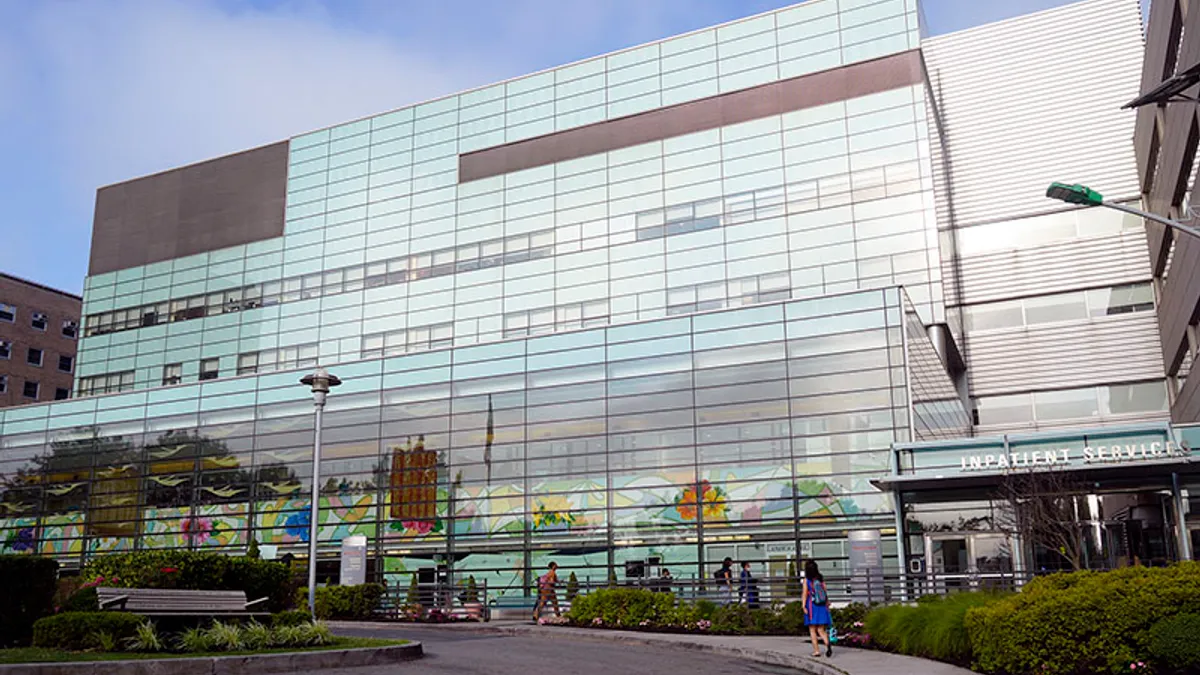Dive Brief:
- NYC Health + Hospitals has completed a large-scale energy efficiency project at its medical facility in Queens, New York, in partnership with the New York City Department of Citywide Administrative Services’ energy management division, the organizations announced Nov. 26.
- The Queens Hospital upgrades include improved control over its HVAC systems, the installation of an advanced chiller plant optimization system, boiler burner control upgrades, modern exterior lighting and WiFi-enabled window air conditioning systems, according to a news release last Tuesday.
- The $8.2 million project, which included $6 million in funding and technical support from DCAS, is expected to cut over $413,000 in annual energy costs, 1.4 million kilowatt-hours of electricity consumption and 218,000 therms, or 21.8 billion British thermal units, of natural gas annually, slashing greenhouse gas emissions by roughly 1,500 metric tons of carbon dioxide equivalent a year, DCAS said.
Dive Insight:
Many hospitals across the nation are saddled with aged equipment that consume far more energy than those with more modern designs. Against that backdrop, healthcare facilities managers have been grappling with constrained access to capital — a situation some say is exacerbated by subtle and overt pressures to halve their greenhouse gas emissions by 2030.
With more than 43,000 employees, NYC Health + Hospitals serves over a million individuals a year in more than 70 patient care locations across all five boroughs in New York City. The Queens Hospital encompasses 360,000 square feet, comprising 253 licensed beds, ambulatory care suites and both primary and specialty services, according to the release.
The Queens Hospital project “marks the latest milestone” in ongoing efforts to optimize energy use and decarbonize building operations through technologies that can reduce energy consumption and emissions, while enhancing the facility’s sustainable infrastructure and creating a healthier environment for patients and staff, DCAS said.
The upgrade is part of DCAS’ Accelerated Conservation and Efficiency Program, which provides funding to facilitate energy efficiency, emissions reduction measures and distributed generation capital projects identified, managed and implemented by partnering city agencies, DCAS said. Over the past decade, DCAS and partner agencies have contributed almost $1 billion across 14,000 completed energy conservation projects, the local agency said. These projects include boiler retrofits, solar panel installations and lighting upgrades, according to ACE’s program webpage.
DCAS’ energy management division is “laser-focused on reducing emissions from our highest-emitting buildings to ensure we meet the city government’s 50% emissions reduction target by 2030,” Sana Barakat, New York City chief decarbonization officer and deputy commissioner of energy management at DCAS, said in a statement. “Large, comprehensive projects like this one at [NYC Health + Hospitals/ Queens] are essential to get us to our targets faster, and we intend to complete and identify more in the coming years.”
The Queens Hospital project will help the city government meet its mandate to halve emissions by 2030 through investments in over thousands of efficiency projects each year, DCAS said. As part of efforts to electrify thermal loads, the upgrades involved installing a heat pump domestic water heater, capturing ambient heat in the air and transferring it to the water — a capability expected to boost HVAC functions, according to the release.
This initiative builds on NYC Health + Hospitals’ broader sustainability goals in Queens. Earlier this year, the health system completed its first solar panel installation, a 55-kilowatt project at its Elmhurst Hospital facility in Queens. At the time, NYC Health + Hospitals CEO and President Mitchell Katz said the initiative would contribute to the organization’s commitment to reduce emissions 50% by 2030 — in line with the objectives of a Health Sector Climate Pledge launched by the U.S. Department of Health and Human Services in 2022.















